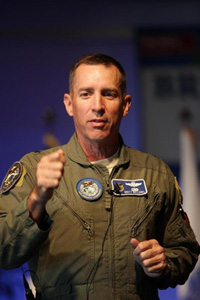TechNet Asia-Pacific 2009 Day 2—SIGNAL's Online Show Daily
Quote of the Day:
“There is no warfare area more important than cyber.”—Vice Adm. Richard W. Hunt, USN, commander of the U.S. Third Fleet
The challenges of the Pacific region and cyberwarfare issues dominated discussion on the second day of TechNet Asia-Pacific 2009 in Honolulu, Hawaii November 2-5. The new J-6 of the Pacific Command (PACOM), Brig. Gen. Brett T. Williams, USAF, began the day by calling for a new relationship between communicators and operators.
Noting that he was the first non-communicator to serve as PACOM J-6, Gen. Williams cited the need for better understanding between the two groups. “We must have a translation piece between the communications community and the operations community,” he said. “I must facilitate that link between [the two]; a lot of that involves translation.
“The operators and planners are not going to learn our language; we have to express ourselves in a way they can understand,” he declared.
Solving this problem is a two-way street, he pointed out. the general cited the need for military forces to have a -6 that is aware of operations, or an operator that is aware of the communications system. Operators need to understand a level of how the communications system works, he added.
 |
| Brig. Gen. Brett T. Williams, USAF, Pacific Command J-6, begins gives the opening keynote address at TechNet Asia-Pacific 2009. |
A panel on cyberwarfare assessed U.S. performance in that area, and the report card was not good. U.S. efforts either lagged or were misguided, and this is one area that is increasing in importance dramatically.
“There is no warfare area more important than cyber,” said panel moderator Vice Adm. Richard W. Hunt, USN, commander of the U.S. Third Fleet. The resultant increased capabilities of cyberspace come with increased vulnerability, and successful operations in other areas depend on our ability to control cyber and to prevent an enemy from damaging it, he stated.
Jim Newman of the Navy
“What happens in cyberspace doesn’t stay in cyberspace; it affects the real world,” he declared. The U.S. military doesn’t need a cyber planning tool; it needs an integrated warfare planning tool.
The Pacific theater of operations is providing new challenges to the U.S. Coast Guard, said the commander of the 14th Coast Guard District. Rear Adm. Manson Brown, USCG, told a luncheon audience that the Coast Guard increasingly is dealing with national security aspects as it carries out traditional missions deep into the Pacific.
Protecting precious fisheries are a national security issue, particularly as small island nations depend on fishing for food and commerce, he noted. If commercial concerns brazenly break rules and overfish, the well-being of these nations is threatened. Food security is a top issue with each of these countries.
Because it can be hard to get multiple nations to agree on something, the Coast Guard is entering into bilateral agreements to pursue joint interests in the vast region. Adm. Brown cited as an example how U.S. Coast Guard surveillance and reconnaissance information passed to its counterpart in Kiribati helped that small island nation catch illegal fishing in its waters. Apprehending the illegal fishers both stopped them and generated $4.7 million in fines’ revenue for Kiribati.
On Wednesday: Addresses by the commander of the 311th Signal Command and the senior vice president and general manager of Qwest Government Services Division, along with two panel discussions.




Comments